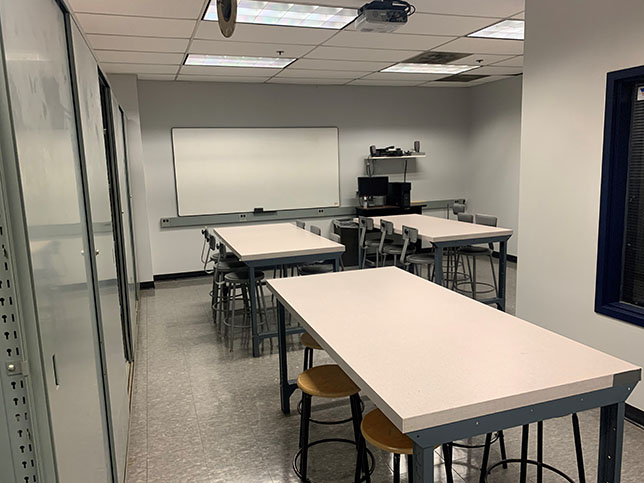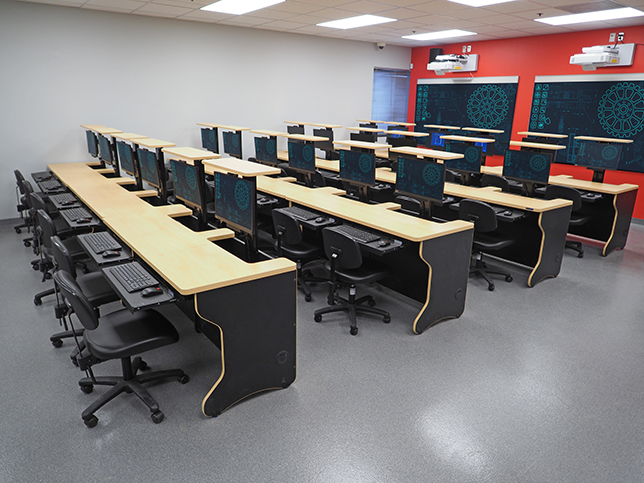New Jersey Institute of Technology Makerspace Gets a Classroom Makeover
By Mira Korber
Walk into the Makerspace at New Jersey Institute of Technology (NJIT) and you will see Computer Numerical Control machinery; waterjet cutters; high-tech 3D printers for metal and plastic; and whiteboards full of ideas, to-do lists, and calculations. While the spacious downstairs is filled with machinery for students to bring theory into practice, the brand new, multi-purpose classroom upstairs is where much of the teaching and learning will prime students for success.
SMARTdesks completed a makeover of the Dieter Weissenrieder Industrial and Manufacturing Engineering Lab in time for the 2021-2022 school year, when incoming students will take on a new set of mechanical, electrical, and industrial engineering challenges. Daniel Brateris, Director of Experiential Learning at NJIT, explained how he decided to work with SMARTdesks and the role the new classroom will have in the engineering curricula. Undergraduate students at NJIT in mechanical, manufacturing, and industrial engineering tracks benefit from instructional modes that blend lecture-based STEM classes with hands-on experience using engineering and programming software.
Brateris said, “In the renovated lab, we wanted to have the computers and then put them away. For a lot of our lecturing, we don’t want people to have a computer because we want to be sure their attention is on us. When I teach, I don’t like having tests, but sometimes it’s the only way to verify that people are actually learning and at the same time, you can’t put everything on the test. So, you have to make sure your audience – your students – are paying attention. That’s one of the hardest things to do in a classroom, especially if you have a class that requires computers. You can walk around at the same time you’re lecturing, and people have YouTube up; the list of distractions goes on and on.”
Brateris approached SMARTdesks to help solve the technology distraction problem while keeping the engineering lab flexible enough to accommodate both lecture-based and computer-based courses. In response, SMARTdesks designed a 24-seat lab with flipIT® motorless monitor lift computer desks that literally rise to the challenge of providing technology to students when necessary and removing it when screen-time detracts from learning. When students need their computers, they push down on the lid at the front edge of the desk, and the LCD display pneumatically rises from beneath the desktop surface. As Brateris said, “What we liked about SMARTdesks was the ability to switch between computer use and a technology-free classroom. There are a lot of lecture-based classes in this room, and there are other classes in here where we will use the computers. We wanted the room available for classes that did not require computers. If the screen is in the down position, now you have a regular classroom.”
SMARTdesks flipIT® motorless monitor lift mechanism also enables the NJIT to switch out their Lenovo ThinkStation CPUs when they need an upgrade, and maple laminate tops tie together the new classroom with existing interior design elements in NJIT’s Makerspace.

Before
The NJIT/SMARTdesks collaboration successfully combined CNC equipment and computer software resources to teach students how to use the machinery in the same space. To that end, a unique feature of the renovated Weissenrieder lab is its HAAS Vertical CNC machine at the rear of the classroom. NJIT instructors teach students how to use specialized software that is too expensive to install on the students’ personal laptops, so it is licensed to university computers instead. Several courses at NJIT rely on Kalypso, an inspection software that has capability to measure within 3 microns of accuracy, or up to 1/10,000th of an inch. Using the software skills gained in class, the goal is for students to emulate real-world processes in the engineering lab, from conceptualization and design, to build, and finally quality control and inspection of the final manufactured parts.

After
When students graduate, they are equipped with engineering skills that develop their leadership potential in mechanical, industrial, and manufacturing engineering fields. Brateris said, “One of the things that affects our competitiveness with the rest of the world is our ability to do things in an automated way. The concept is to teach our students many parts of the automation process. First, design the best workflow and process possible. Then, the parts need to be made as efficiently as possible. Determine the critical features of the part and which features need to be precision machined. Learning how all those elements tie together is very important.”
To accomplish this goal, NJIT curricula is focused on core concepts of how to create one part, replicate, and scale that process to create 10,000 identical parts in an automated way. Brateris explained that capable engineers know how to program CNC machines with an algorithm that instructs the machines to correct trends in very small differences in parts from factors such as wear on the tool. As that happens, the inspection machine will dynamically tell the milling machine to remeasure and adjust the cutting path to compensate for small deviations. He said, “For us, it is important that our students have mastery of a logical ability to solve a problem. If the engineer has specific knowledge as to what could be causing the problem, this gives enough knowledge to address the problem and work towards a resolution.”
Future goals for the renovated engineering lab include not only applied learning for NJIT students, but also professional training for the local community of industry in the New York metropolitan area. Local to NJIT, there are a significant number of capable machinists who lack computer machining knowledge. Many engineers who are still working manually want to learn more automated machining techniques, and Brateris plans to further build out professional development curricula. As the director of experiential learning, he oversees any education projects that go beyond a textbook. It is his goal that with the addition of robotics courses for automation, welding, visual inspection, sanding, and polishing, both NJIT students and local professionals will learn how to optimize industrial output in the renovated engineering lab.
Part of the NJIT mission is not only to develop capable engineers, but also imbue them with a sense of responsibility. During the most stringent lockdown period of COVID-19, the Makerspace was far from quiet. As soon as contractors were allowed on-site, renovations to the upstairs classroom began, as well as a massive project that built and delivered 25,000 injection-molded face shields to local healthcare facilities. Brateris explained that many people at home also used their 3D printers to output PPE in the form of face shields.
However, the unsuspecting good Samaritans were not aware that tiny voids in the 3D plastic prevented cleaning agents from sufficiently disinfecting the surface; therefore, hospitals could only use the PPE once before throwing it away. Although 3D printing has developed into a promising tool, Brateris warned against overstating its capabilities before the technology matures to its full potential. In his words, “Once [3D printing] designs were posted online, the making community bought up nearly all the thin plastic on the market, making the wasteful shields, and it was hard for us to procure plastic that could be reused for up to three months. This is why we try to educate very responsible engineers. Even people with a good mindset can cause very unknown consequences.”
About SMARTdesks: SMARTdesks works hand in hand with clients to furnish safe learning spaces for in-person, hybrid, and remote learning. Learn more at https://smartdesks.com.
Mira Korber has served as the Chief Strategy Officer for SMARTdesks since the beginning of the COVID-19 pandemic. Mira is also the founder of an education enrichment and tutoring company, Blue Ribbon Scholars LLC. In 2016, Mira graduated cum laude from Yale University. In 2021, she will attend Peabody College at Vanderbilt University to begin a Master’s program in Education Policy.